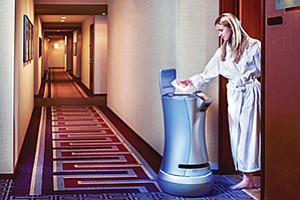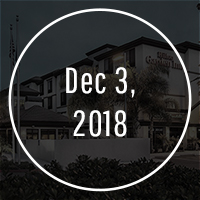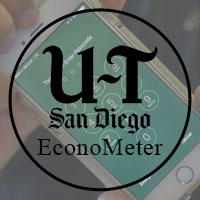Hotels Make Room For Robots on Staff
TECH: Bots Could Reduce Labor Costs
By LOU HIRSH
Originally published May 18, 2017 at 1:51 p.m., updated May 18, 2017 at 1:51 p.m.
An autonomous service robot named Relay, from technology maker Savioke, delivers food, towels and other items directly to hotel guests in their rooms. A newly opened Fairfield Inn & Suites in San Marcos is the first hotel in the local region to deploy the technology.
San Diego — Forgot to bring toothpaste? Need an extra towel? Craving a snack?
Relay will take care of you.
That’s the name of the 3-foot-tall service robot resembling “Star Wars”’ R2-D2 that is serving guests at the newly opened Fairfield Inn & Suites in San Marcos.
Co-developed with locally based Sea Breeze Properties, the San Marcos hotel is the first in the San Diego region using fully autonomous robots developed by San Jose-headquartered Savioke.
Using specialized sensors, geo-positioning and other intelligent on-board technologies, the robots are programmed by Savioke to deliver items to any and all locations of a hotel, freeing up front-desk and other personnel to focus on their other responsibilities.
The technology could have a profound impact on the labor-intensive hotel industry. In addition to working 24/7, Relay is fairly fast and user-friendly, and doesn’t call in sick or ask for vacations or pay raises.
“You’re going to see this become much more common over the next three to five years in the industry,” said property owner Robert Rauch, CEO of San Diego’s RAR Hospitality Inc. and a longtime lodging industry consultant. “It is one effective way to deal with rising labor costs.”
$2,000 a Month
Rauch said his company, which employs about 30 people in San Marcos, leases one Relay to serve the new 116-room Fairfield Inn, at a cost of $2,000 per month under a three-year agreement with Savioke. He will be gauging its effectiveness in coming months before deciding whether to deploy the robot at other hotels that his company owns and manages.
But he added there are already signs that the major global hotel companies are itching to begin using the autonomous technology, which could soon become standard equipment globally.
Rauch noted that Hilton Worldwide is expected to begin its first significant pilot programs before the end of 2017, and will be followed soon after by Marriott International and the Starwood Hotels & Resorts brands that Marriott acquired last year, including Sheraton and W.
Many tech providers are gearing up to serve the hospitality and food service industries. In addition to the four-year-old Savioke, those include larger, longer-established players such as U.K.-based Starship Technologies and the Japanese electronics giant Panasonic Corp.
Convenience Factor
Reporting the results of its nationwide lodging industry technology study last spring, the news publication Hospitality Technology noted that 54 percent of hotels planned to spend more on technology during 2016 than in the prior year. The biggest priorities for technology spending, in order, were payment security, guest-room tech, internet service bandwidth, and mobile engagement with customers.








